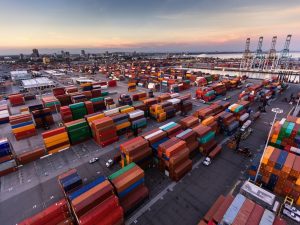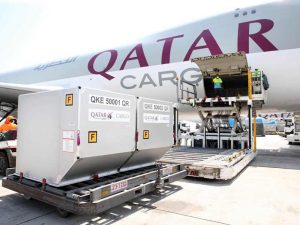Air France-KLM Group announced that Tata Communications, a global digital ecosystem enabler, has joined its Corporate SAF program to promote and develop the use of Sustainable Aviation Fuel (SAF). Tata Communications is the first global corporate from India to join this program which actively supports the transition to Sustainable Aviation Fuel and will therefore contribute to the reduction of the CO2 emissions generated by aviation. Sustainable Aviation Fuels are the most decisive ways of reducing CO2 emissions in the aviation industry. However, the production is currently very limited and SAF represented approximately 0.1% of the global jet fuel use in 2022. The corporate SAF program allows Air France-KLM to partner with organizations to accelerate the production and usage of SAF, and thus pave the way towards making SAF more readily available with the aim to contribute to a more sustainable future in aviation. SAF projects selected by Air France-KLM reduce CO2 emissions by at least 75% compared to conventional jet fuel on a lifecycle basis. Speaking on the announcement, Claude Sarre, General Manager Indian Sub-Continent , Air France-KLM said: “Decarbonizing aviation comes with several challenges, compelling the industry to collaborate with various stakeholders and seek innovative solutions to minimize the environmental impact. As a responsible player, sustainability is embedded at the core of the Air France- KLM Group’s strategy, with a strong emphasis on the development and use of Sustainable Aviation Fuels (SAF). We are proud to welcome Tata Communications in the Air France–KLM Corporate SAF Program. This agreement is significant towards raising awareness and addressing sustainability challenges the aviation industry faces. Tata Communications, has a strong commitment towards environment preservation. We are happy to take the first step of …
Read More »‘FTAs will increase speed, global reach and trade volume’
Vipin Vohra, Chairman, Continental Carriers says prioritizing air cargo in Foreign Trade Agreements (FTAs) can have a significant impact on international trade. It will increase speed, efficiency, and resilience of perishable and high-value goods supply chain, global reach and it can lead to increased trade volume, faster delivery times, and improved access to global markets for certain industries. He says, “Air cargo is known for its speed and efficiency in transporting cargo across borders. Prioritizing air cargo in FTAs can lead to quicker delivery times, reducing lead times for businesses and consumers. Air cargo is particularly useful for transporting perishable goods (like fresh produce and pharmaceuticals) and high-value goods (like electronics and luxury items) that require swift transportation to maintain their quality and value. Supply Chain Resilience: The COVID-19 pandemic highlighted the importance of supply chain resilience. Air cargo was critical for transporting medical supplies and vaccines during the pandemic. Prioritizing air cargo in FTAs can help ensure a resilient supply chain for essential goods. Global Reach: Airports and airlines cover a wide range of destinations, allowing businesses to access global markets easily. This can be especially beneficial for countries with limited land connections or geographical constraints. The impact of prioritizing air cargo in FTAs on cross-border trade depends on the specific circumstances of the countries involved. It can lead to increased trade volume, faster delivery times, and improved access to global markets for certain industries. However, it’s essential to strike a balance between air cargo and other modes of transportation to ensure diverse trade options and mitigate environmental and cost-related concerns.” While there are benefits to prioritizing Air Cargo in FTAs, it’s crucial to consider the broader implications, including …
Read More »FFFAI, LSC partner to create awareness on apprenticeship training
The Federation of Freight Forwarders Associations in India (FFFAI) and Logistics Sector Skill Council (LSC) jointly organized a webinar to create awareness on Apprenticeship Training on 12th September 2023. Shankar Shinde, Chairman, FFFAI chaired the webinar. Dr T.C. Saravanabava highlighted that Apprenticeship Training is one of the most efficient ways to develop skilled manpower for the country. It provides for an industry led, practice oriented, and efficient mode of formal training. The National Apprenticeship Act was enforced in the year 1959 at first on the voluntary cause. The bill was presented before the parliament during 1961 and was enforced from 1st January 1963. The act was amended twice in 1973 and 1986. There are 38 sections and one schedule. The schedule is in regard to the adjustments in Workmen’s Compensation Act, 1923 with reference to its application to students under the Apprentices Act, 1961. The panelists included Sudhir Agarwal, Treasurer and OB in charge, Skill Development Committee, FFFAI; Dushyant Mulani, Chairman Elect, FFFAI; Tej Contractor, President, IIFF; Dr. T.C. Saravanabava, Head Apprenticeship, LSC, and Anthony Coelho, Vice President, LSC. Also present on this occasion was Vinod Sharma, Secretary, FFFAI. A large number of FFFAI Member organisations from across the country participated in the webinar. The core objective of the webinar implementation of Apprenticeship training in the FFFAI member organizations.
Read More »Jeena adopts AI tools to enhance logistics efficiency
Jeena & Company has introduced artificial intelligence to further improve productivity and enhance customer-focused working. The company has integrated its Customs House Agent (CHA) software with an AI solution that has already produced outstanding results. Among the notable achievements of this integration is the introduction of “Single Click Automation.” By infusing AI into various external interface processes, the Company has achieved remarkable efficiency gains. This includes the effortless digitization, signing, and uploading of PDF documents to external portals, accompanied by real-time tracking of all PDF documents within their ERP system. Additionally, the company now generates, digitally signs, and uploads flat files to the portal, automatically capturing bill numbers. As a result, lead times that once spanned 30 minutes have been drastically reduced to an astonishing 3 minutes. Jeena & Company has also embraced API integration, elevating the client experience to unparalleled heights. With live portal data directly accessible on the application system, customers can retrieve vital information without the hassle of external portal logins. Moreover, the option to seamlessly download live Excel data from the external portal through Jeena & Company’s system simplifies data retrieval and analysis, ensuring clients have all the necessary tools at their disposal.
Read More »FedEx struggles market weakness, cut costs
FedEx is continuing to focus on cost saving initiatives in response to weak express demand as it reported revenue of $21.7bn in its first quarter 2024, ended August 31. The company attributed a 19% improvement in reported net income to $1.1bn to its ‘DRIVE’ programme t0 improve operational efficiency and reduce expenses. “First quarter results improved primarily due to the execution of the company’s DRIVE program initiatives and continued focus on revenue quality. The improvement in operating results was partially offset by ongoing demand weakness,” said the company. Revenue at FedEx Express was down 9% year over year, but the division benefited from reduced operating expenses. “Volume remained pressured though total Express volume declines moderated sequentially,” noted Brie Carere, executive vice president, chief customer officer. FedEx Express operating income increased 18% during the quarter. “Cost reductions and transformation efforts at FedEx Express included structural flight reductions, alignment of staffing with volume levels, parking aircraft, and shifting to one delivery wave per day in the US, all of which more than offset the impact of lower revenue,” added John Dietrich, executive vice president, chief financial officer.
Read More »Relaxed Cabotage Law to drive growth in container logistics
In a bold and far-reaching move, India’s decision to relax its cabotage law has sent ripples throughout the country’s container logistics industry, promising to usher in a new era of competition, efficiency, and opportunities while also presenting challenges to domestic players. “The relaxation of cabotage laws is set to intensify competition in India’s container logistics sector. Foreign-flagged ships can now ply Indian coastal routes without the need for permits, injecting a fresh wave of competition into the market. This development is expected to drive down shipping costs and potentially boost India’s global trade presence in the long run. With foreign vessels entering the market, shippers and cargo owners can anticipate more competitive pricing and improved service options. The increased competition will likely push logistics providers to offer cost-effective solutions, benefiting importers and exporters alike. Cost savings and greater efficiency in the transportation of goods are on the horizon.”, said Christian Roeloffs, CEO and Co-Founder, Container xChange. To accommodate the surge in coastal shipping activity, we can anticipate significant investments in port infrastructure and connectivity enhancements. This anticipated development could lead to faster turnaround times, increased cargo handling capacity, and more streamlined logistics operations, ultimately reducing overall transportation costs.
Read More »AISATS honored as Associate Media Partner at ICA
Air India SATS Airport Services (AISATS) was felicitated as the Associate Media Partner at recently held India Cargo Awards in New Delhi. Piyush Srivastava, IES, Senior Economic Advisor graced the occasion as the Chief Guest. Known as the “Oscars of the Cargo Industry,” the India Cargo Awards 2023, hosted by Cargo Talk (DDP Group Publication) serves as an all-India platform created with a vision to recognise excellence in the Cargo-Freight-Logistics Industry across various domains, including Rail, Road, Air, Sea, Allied Services, Warehousing, Technology, 3rd Party Logistics, and more. Our world-class awards ceremonies are known for their formal Black-Tie affair, filled with glitz and glamour, attended by the most influential personalities in the industry.
Read More »Silk Way West rolls out capacity on cargo.one platform
Silk Way West Airlines has now rolled out its capacity on the cargo.one online booking platform. The carrier first announced it would place its capacity on cargo.one back in May but its services are now bookable via the platform. Silk Way West Airlines chief executive Wolfgang Meier said: “We are thrilled to embark on this journey with cargo.one. This endeavor is an exciting milestone that perfectly aligns with our commitment to providing innovative solutions and superior customer experiences. “We believe that the integration of cargo.one’s digital platform will set a new standard for airfreight booking.” The airline said that cargo.one offers a “user-friendly interface that simplifies booking processes and optimizes capacity utilization”. This would ultimately reduce costs and improve overall efficiency. “The platform includes benefits such as an intuitive booking experience, enhanced efficiency, expanded global reach, and a strong focus on delivering exceptional customer service to businesses,” the carrier added. Bookings can also be made directly on the Silk Way West website, a functionality that was added back in August last year.
Read More »‘Prioritizing air cargo in FTAs will boost India’s economic growth’
Keku Bomi Gazder, MD and CEO, Aviapro Logistic Services says, “Prioritizing air cargo in FTAs can streamline cross-border trade, boost economic activities, and help nations fully harness the benefits of international commerce. Prioritizing air cargo in FTAs can offer several advantages to India’s EXIM (Export-Import) trade, investments, and participation in global markets. India’s exports, especially in sectors like pharmaceuticals, textiles, and electronics, can benefit from quicker and more reliable transportation through air cargo. This can open new markets and increase export volumes. A robust air cargo infrastructure can make India more attractive to foreign investors looking to establish supply chains or manufacturing operations in the country. It enhances India’s position as a favourable investment destination. Participation in global value chains becomes more accessible when there’s efficient air cargo connectivity. Indian businesses can become integral parts of international production networks. Increased exports and foreign investments stimulated by prioritizing air cargo can contribute to economic growth, job creation, and overall prosperity. It enhances India’s competitiveness on the global stage by reducing logistics costs and lead times. Overall, prioritizing air cargo in FTAs can serve as a catalyst for India’s economic growth, boosting exports, attracting investments, and strengthening its position in the global marketplace.”
Read More »Qatar Cargo partners with Xiamen Airlines for global ops
Qatar Airways Cargo is pleased to announce a new partnership with Xiamen Airlines, the first Chinese airline to operate passenger non-stop flights from Mainland China to Qatar. The new partnership will allow Qatar Airways Cargo to provide additional belly cargo capacity for customers to and from Mainland China. Under the cooperation agreement, Xiamen Airlines will launch daily flights between Beijing’s Daxing International Airport (PKX) to Doha’s Hamad International Airport. The flights will commence on 20 October 2023. In addition to the flights from Beijing, Xiamen Airlines will also launch two weekly flights from Xiamen (XMN), the special economic zone of Fujian Sheng province, to Doha, commencing 31 October 2023. Xiamen Airlines will connect DOH with PKX (seven times a week) and XMN (two times a week), providing more than 100 tonnes of capacity on board both flights. The new direct services from Beijing to Doha will be operated by a Boeing 787-9 and Xiamen-Doha-Xiamen service will be operated by a Boeing 787-8. Elisabeth Oudkerk, SVP Cargo Sales & Network Planning at Qatar Airways Cargo said: “China has always been a key market for us and our customers. We are delighted to be able to offer our clients even more capacity. We will now serve 9 destinations in Mainland China, offering over 2,800 weekly tonnes of cargo capacity. We welcome Xiamen Airlines and look forward to working closely with them.” Mr. Tong Qianju, Vice President of Xiamen Airlines Cargo said: “Xiamen Airlines Cargo is very happy to expand its network reach for the first time to the Middle East, and we are very honored to do this with one of the top air cargo carriers in the world – Qatar Airways …
Read More » Cargo Breaking News
Cargo Breaking News









